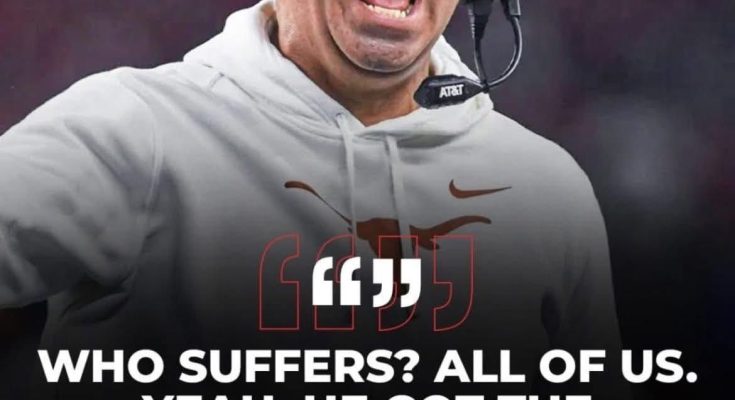Steve Sarkisian, as the head coach of the Texas Longhorns, faces a critical challenge that extends beyond just winning games—it’s about transforming the team’s discipline on the field. Penalties have been a recurring issue for the Longhorns, often undermining their performance, momentum, and ultimately, their ability to secure victories. To restore Texas to its former glory and establish a culture of excellence, Sarkisian must take decisive and strategic action to eliminate costly mistakes that come in the form of penalties.
Penalties in football are more than just lost yardage; they disrupt rhythm, drain morale, and give opponents advantages that can shift the tide of a game. For a program with the rich tradition and expectations like Texas, the accumulation of penalties is unacceptable. Sarkisian’s task is not simply to reduce penalties marginally, but to fundamentally change the mindset and habits of his players to uphold discipline as a core value.
The first step in this process is fostering a culture of accountability. Sarkisian needs to make it clear that penalties are not tolerated at any level. This means establishing strict consequences for repeat offenders but also reinforcing positive behavior when players exhibit discipline and smart decision-making. Accountability must be embraced by the entire coaching staff, who must set high standards and consistently enforce them. When players understand that penalties have direct repercussions on their playing time or roles, they are more likely to internalize the importance of playing clean.
Additionally, education plays a crucial role. Many penalties come from mental lapses, lack of understanding of the rules, or poor technique. Sarkisian and his coaches must dedicate time to ensuring players fully grasp the rules of the game and understand how specific penalties harm the team. This can involve detailed film study sessions focusing on previous infractions, helping players recognize and learn from their mistakes. Moreover, technique training should be emphasized to reduce penalties such as false starts, holding, or illegal formations, which often arise from poor execution rather than willful negligence.
Another critical area to address is the preparation and mental readiness of the team. Penalties frequently occur during moments of pressure or fatigue, when players lose focus or try to do too much. Sarkisian should incorporate mental conditioning into practice, teaching players how to stay calm, focused, and composed under stressful situations. This can involve mindfulness exercises, visualization techniques, or situational drills that simulate high-pressure moments. By preparing players mentally, the likelihood of impulsive, penalty-inducing actions diminishes.
Furthermore, Sarkisian should analyze the specific types of penalties the Longhorns incur and tailor interventions accordingly. For instance, if the team suffers from numerous false start penalties, it suggests issues with snap timing or concentration on the offensive line. Targeted drills that emphasize timing and focus can help address this problem. If defensive penalties like pass interference or illegal contact are prevalent, it may point to technique or positioning problems that coaches must correct through repeated practice and feedback.
Communication is also essential in reducing penalties. On-field confusion often leads to mistakes that result in penalties. Sarkisian should ensure that communication protocols are clear and efficient, from the coaching staff to the players and among players themselves. This includes proper signaling, clear audibles, and ensuring everyone understands their assignments. When players are confident in their roles and the play call, they are less likely to make errors that lead to penalties.
Leadership within the team can greatly influence discipline. Sarkisian should empower team captains and veteran players to serve as enforcers of the discipline culture. These leaders can hold teammates accountable, set examples through their conduct, and provide peer-to-peer motivation to stay penalty-free. When discipline is enforced from within the player ranks, it resonates more strongly than solely from coaches.
In practice, drills that simulate game situations with a focus on discipline can be beneficial. For example, implementing competitive drills where penalties result in immediate consequences such as extra conditioning or loss of repetitions can create a sense of urgency and awareness. Reinforcing the idea that every penalty has tangible costs helps players develop a mindset of precision and control.
Sarkisian should also leverage technology and analytics to identify patterns in penalties. By reviewing game and practice data, the coaching staff can pinpoint specific situations, players, or tendencies that lead to penalties. This data-driven approach allows for targeted corrections and personalized coaching, making interventions more effective.
Moreover, building a strong, supportive team culture helps reduce frustration and emotional penalties like unsportsmanlike conduct or personal fouls. Sarkisian should focus on fostering camaraderie, trust, and resilience within the team so players are less likely to act out in anger or frustration. When players feel supported and connected, they maintain composure better even in adverse situations.
Lastly, Sarkisian’s own leadership style sets the tone for the entire program. His commitment to discipline, his ability to motivate, and his clear communication of expectations shape the team’s identity. Leading by example, being consistent, and showing genuine investment in the players’ growth both on and off the field inspire them to rise to higher standards.
In conclusion, Steve Sarkisian’s challenge to rid the Texas Longhorns of penalties is multifaceted and requires a holistic approach. It involves instilling a culture of accountability, educating players thoroughly, enhancing mental and physical preparation, improving communication, leveraging leadership, utilizing data insights, and building a supportive team environment. By addressing the root causes of penalties and implementing these strategies, Sarkisian can transform the Longhorns into a disciplined, focused, and successful team worthy of their storied history. The road to penalty-free football is demanding, but with consistent effort and strategic leadership, it is an attainable goal that will significantly improve Texas’s chances for sustained success.



